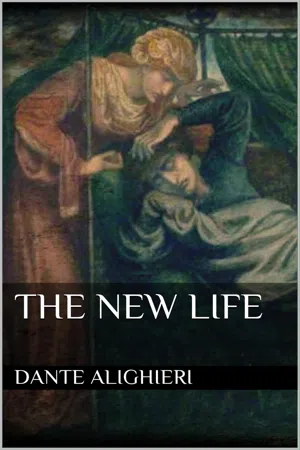Canst thou indeed be he that still would sing
Of our dear lady unto none but us?
For though thy voice confirms that it is thus,
Thy visage might another witness bring.
And wherefore is thy grief so sore a thing
That grieving thou mak’st others dolorous?
Hast thou too seen her weep, that thou from us
Canst not conceal thine inward sorrowing?
Nay, leave our woe to us: let us alone:
’Twere sin if one should strive to soothe our woe,
For in her weeping we have heard her speak:
Also her look’s so full of her heart’s moan
That they who should behold her, looking so,
Must fall aswoon, feeling all life grow weak.
This sonnet has four parts, as the ladies in whose person I reply had four forms of answer. And, because these are sufficiently shown above, I stay not to explain the purport of the parts, and therefore I only discriminate them. The second begins here, “And wherefore is thy grief;” the third here, “Nay, leave our woe;” the fourth, “Also her look.”
A few days after this, my body became afflicted with a painful infirmity, whereby I suffered bitter anguish for many days, which at last brought me unto such weakness that I could no longer move. And I remember that on the ninth day, being overcome with intolerable pain, a thought came into my mind concerning my lady: but when it had a little nourished this thought, my mind returned to its brooding over mine enfeebled body. And then perceiving how frail a thing life is, even though health keep with it, the matter seemed to me so pitiful that I could not choose but weep; and weeping I said within myself: “Certainly it must some time come to pass that the very gentle Beatrice will die.” Then, feeling bewildered, I closed mine eyes; and my brain began to be in travail as the brain of one frantic, and to have such imaginations as here follow. And at the first, it seemed to me that I saw certain faces of women with their hair loosened, which called out to me, “Thou shalt surely die;” after the which, other terrible and unknown appearances said unto me, “Thou art dead.” At length, as my phantasy held on in its wanderings, I came to be I knew not where, and to behold a throng of dishevelled ladies wonderfully sad, who kept going hither and thither weeping. Then the sun went out, so that the stars showed themselves, and they were of such a colour that I knew they must be weeping: and it seemed to me that the birds fell dead out of the sky, and that there were great earthquakes. With that, while I wondered in my trance, and was filled with a grievous fear, I conceived that a certain friend came unto me and said: “Hast thou not heard? She that was thine excellent lady hath been taken out of life.” Then I began to weep very piteously; and not only in mine imagination, but with mine eyes, which were wet with tears. And I seemed to look towards Heaven, and to behold a multitude of angels who were returning upwards, having before them an exceedingly white cloud: and these angels were singing together gloriously, and the words of their song were these: “ Osanna in excelsis ;” and there was no more that I heard. Then my heart that was so full of love said unto me: “It is true that our lady lieth dead;” and it seemed to me that I went to look upon the body wherein that blessed and most noble spirit had had its abiding-place. And so strong was this idle imagining, that it made me to behold my lady in death; whose head certain ladies seemed to be covering with a white veil; and who was so humble of her aspect that it was as though she had said, “I have attained to look on the beginning of peace.” And therewithal I came unto such humility by the sight of her, that I cried out upon Death, saying: “Now come unto me, and be not bitter against me any longer: surely, there where thou hast been, thou hast learned gentleness. Wherefore come now unto me who do greatly desire thee: seest thou not that I wear thy colour already?” And when I had seen all those offices performed that are fitting to be done unto the dead, it seemed to me that I went back unto mine own chamber, and looked up towards Heaven. And so strong was my phantasy, that I wept again in very truth, and said with my true voice: “O excellent soul! how blessed is he that now looketh upon thee!”
And as I said these words, with a painful anguish of sobbing and another prayer unto Death, a young and gentle lady, who had been standing beside me where I lay, conceiving that I wept and cried out because of the pain of mine infirmity, was taken with trembling and began to shed tears. Whereby other ladies, who were about the room, becoming aware of my discomfort by reason of the moan that she made, (who indeed was of my very near kindred,) led her away from where I was, and then set themselves to awaken me, thinking that I dreamed, and saying: “Sleep no longer, and be not disquieted.”
Then, by their words, this strong imagination was brought suddenly to an end, at the moment that I was about to say, “O Beatrice! peace be with thee.” And already I had said, “O Beatrice!” when being aroused, I opened mine eyes, and knew that it had been a deception. But albeit I had indeed uttered her name, yet my voice was so broken with sobs, that it was not understood by these ladies; so that in spite of the sore shame that I felt, I turned towards them by Love’s counselling. And when they beheld me, they began to say, “He seemeth as one dead,” and to whisper among themselves, “Let us strive if we may not comfort him.” Whereupon they spake to me many soothing words, and questioned me moreover touching the cause of my fear. Then I, being somewhat reassured, and having perceived that it was a mere phantasy, said unto them, “This thing it was that made me afeard;” and told them of all that I had seen, from the beginning even unto the end, but without once speaking the name of my lady. Also, after I had recovered from my sickness, I bethought me to write these things in rhyme; deeming it a lovely thing to be known. Whereof I wrote this poem:—
A very pitiful lady, very young,
Exceeding rich in human sympathies,
Stood by, what time I clamour’d upon Death;
And at the wild words wandering on my tongue
And at the piteous look within mine eyes
She was affrighted, that sobs choked her breath.
So by her weeping where I lay beneath,
Some other gentle ladies came to know
My state, and made her go:
Afterward, bending themselves over me,
One said, “Awaken thee!”
And one, “What thing thy sleep disquieteth?”
With that, my soul woke up from its eclipse,
The while my lady’s name rose to my lips:
But utter’d in a voice so sob-broken,
So feeble with the agony of tears,
That I alone might hear it in my heart;
And though that look was on my visage then
Which he who is ashamed so plainly wears,
Love made that I through shame held not apart,
But gazed upon them. And my hue was such
That they look’d at each other and thought of death;
Saying under their breath
Most tenderly, “O let us comfort him:”
Then unto me: “What dream
Was thine, that it hath shaken thee so much?”
And when I was a little comforted,
“This, ladies, was the dream I dreamt,” I said.
“I was a-thinking how life fails with us
Suddenly after such a little while;
When Love sobb’d in my heart, which is his home.
Whereby my spirit wax’d so dolorous
That in myself I said, with sick recoil:
‘Yea, to my lady too this Death must come.’
And therewithal such a bewilderment
Possess’d me, that I shut mine eyes for peace;
And in my brain did cease
Order of thought, and every healthful thing.
Afterwards, wandering
Amid a swarm of doubts that came and went,
Some certain women’s faces hurried by,
And shriek’d to me, ‘Thou too shalt die, shalt die!’
“Then saw I many broken hinted sights
In the uncertain state I stepp’d into.
Meseem’d to be I know not in what place,
Where ladies through the street, like mournful lights,
Ran with loose hair, and eyes that frighten’d you
By their own terror, and a pale amaze:
The w...





